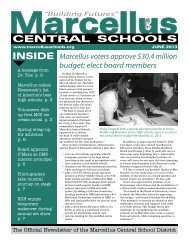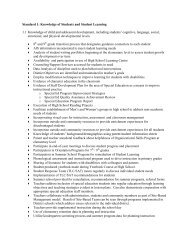Download the MCS Advocacy Toolkit (PDF) - Marcellus Central ...
Download the MCS Advocacy Toolkit (PDF) - Marcellus Central ...
Download the MCS Advocacy Toolkit (PDF) - Marcellus Central ...
- No tags were found...
You also want an ePaper? Increase the reach of your titles
YUMPU automatically turns print PDFs into web optimized ePapers that Google loves.
“Building Futures”<strong>Central</strong> School District4What does effective advocacy look like?Personal contact with legislators helps buildrelationships and establish lines of communicationthat ensure that <strong>the</strong> district’s story is being heard.Whe<strong>the</strong>r you choose to contact your representativesby phone, e-mail or in-person, please keep in mind <strong>the</strong>following tips to help you convey your message in <strong>the</strong>most effective way possible:• Be brief. Stick to your key points and be mindfulthat legislators are often very busy and face avariety of special interest groups that compete for<strong>the</strong>ir time and attention.• Be respectful. Even if you disagree on a position, berespectful in your dialogue and stick to <strong>the</strong> facts.When appropriate be passionate, not emotional.• Be clear and specific. Let legislators know exactlywhat you want <strong>the</strong>m to do (i.e., vote in favor of abill, pass legislation) in a way that requires a “yes”or “no” response. Ask <strong>the</strong>m how <strong>the</strong>y will vote,follow-up on your conversation, and hold <strong>the</strong>maccountable.• Be a reliable source of information. Research yourissue and know <strong>the</strong> facts so that you can provideinformation to legislators and answer <strong>the</strong>irquestions. Do not assume that legislators knowspecifics about <strong>the</strong> school district or education issuesin general. Be prepared to follow-up with answers toany questions you may not know on <strong>the</strong> spot.• Be honest about your concerns. Paint <strong>the</strong> real pictureof your situation, even if it is scary. Share <strong>the</strong>ramifications of an action/inaction for yourcommunity’s schools and children. Use personal orcompelling stories coupled with facts and data.• Be timely and persistent. If an issue has a deadline,such as <strong>the</strong> passage of <strong>the</strong> state budget, makesure you give legislators enough time to respondto <strong>the</strong> issue. Frequent, regular reminders about<strong>the</strong> importance of <strong>the</strong> issue, particularly frommultiple advocates, can increase <strong>the</strong> likelihood thatlegislators will pay attention to <strong>the</strong> cause.Tips for effective written correspondenceSome forms of written communication are more effective than o<strong>the</strong>rs. While e-mails and form letters are fine,personal letters (perhaps even hand-written) convey a stronger message. They demonstrate <strong>the</strong> importance of yourconcerns by showing you went out of your way to make <strong>the</strong>m known. Writing a letter and making a follow-up phonecall takes a few minutes, but those steps ensure that your legislator knows just how you want to be represented.When writing a letter, you should:• Keep your letter short; a single page is best.• Be concise and specific, but add personal toucheson how your selected issue impacts you and yourfamily.The letter should include <strong>the</strong> following parts:• Introduction• Problem statement• Proposed solution• Conclusion and call to actionBe sure to include all of your contact information (e.g., home address, phone number, e-mailaddress), so your legislator can reply to you.www.marcellusschools.org










